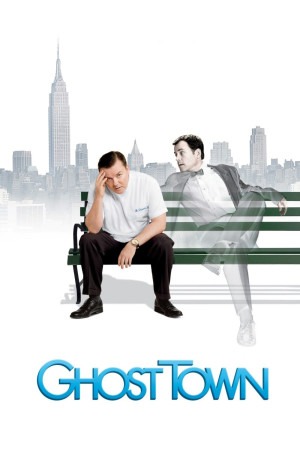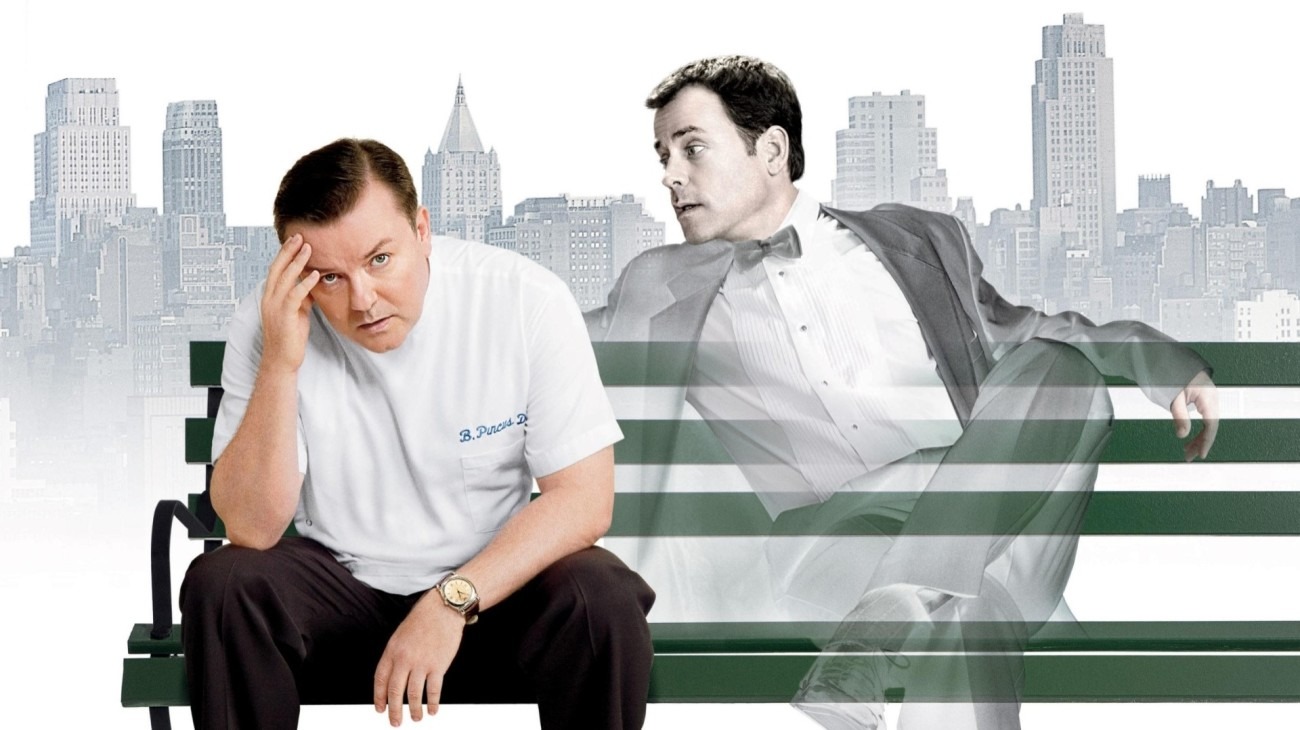
Down among the dead men
First things first. The most unique thing, by far, about the sweetly minor comedy Ghost Town comes during the opening credits: for this is where we find that the film joins the exceedingly rarefied company of Films That Could Afford To Have A Beatles Song On The Soundtrack (this comes at a cost; there are only about eight songs total in the film, compared to the 20 or so that usually pop up in little cameos throughout). Weirdly, having spent what was doubtlessly a significant portion of the total budget on a single 2.5 minute clip of two-channel audio, the filmmakers do absolutely nothing of interest with it - the song in question, "I'm Looking Through You", has been dropped in the movie solely for its value as a pun. See, it's a film about ghosts, and you can't see ghosts. They're invisible. You look through them. For this, Spyglass Entertainment spent a couple million dollars.
Anyway, that unfortunate bit of literalist song interpretation is quite possibly the weakest single moment in a comedy that will hardly set the world on fire, but is nevertheless a great deal better than anything in its trailers or massively sitcommy concept would give you reason to believe. Largely, this is because the film doesn't try very hard to be big and zany, like virtually every other studio-financed comedy produced in America in the last ten years, preferring instead the low-key and simple (it almost feels like something sweet and mild from the mid-'30s, before screwball comedies took over, and I do mean for those to be words of praise). This means, to a certainty, that it's not tremendously funny; but it's also not grating or obnoxious, and the state of the art is debased enough for that to count as a triumph.
Ghost Town wears its pitch meeting on its sleeve, although I must admit to being slightly confused as to which pitch was actually used. Was it, "a whole movie centered on the Whoopi Goldberg character in Ghost"? Or, "a comedy version of The Sixth Sense, with Haley Joel Osment as a grown-up". Maybe it was in between: "Ghost plus The Sixth Sense. But funny". All I know is that the central concept is pretty musty, but treated with an appealing lack of irony by all concerned, which in this case is basically the same thing as director and co-writer David Koepp, best known as the remarkably inconsistent screenwriter of everything from Jurassic Park to The Lost World: Jurassic Park. This is his first romantic comedy, in any capacity, and damned if he doesn't do some justice to one of the most hackneyed, worn-out genres in all of modern cinema.
The ghost town of the title is New York City, where a relentlessly misanthropic dentist named Bertram Pincus (Ricky Gervais) dies for seven minutes during a routine colonoscopy, having demanded unnecessary anesthesia in order to cope with the procedure. That tiny case of death leaves Bertram able to see the Other Side, or at least all the ghosts of those who've died in New York with unfinished business, the pushiest of whom is Frank Herlihy (Greg Kinnear), in life a cheating asshole businessman who now wants Bertram to help him stop his Egyptologist wife Gwen (Téa Leoni) from remarrying. Things grow messed up when Bertram falls a bit in love with Gwen - the first time his cynical shell has been cracked in years - and he starts to use Frank's ghostly reminiscences to court the dead man's widow.
That's pretty musty, right? Yet it works. And even more surprisingly, it's actually a pretty great starring vehicle for Gervais, a genius writer in his own right (I dearly hope you already know and love his two BBC sitcoms, the original The Office and Extras), whose presence in this film looked at first like the producers' cynical attempt to grab some street cred plus the actor's own desire to become an American star, with all the paydays that brings, and turns out to be nothing of the kind. Honest to God, this is a pretty great role for the actor, perfectly in line with his sensibilities (on paper, it looks almost like a parody of the Gervais stock character, but the dialogue is good and he delivers it with tremendously right timing), although a bit more sympathetic than he usually writes for himself (naturally, this is Hollywood). He even makes a reasonably credible romantic lead, particularly opposite Leoni - pretty great herself, as usual, all half-cocked smiles and wistfully witty line readings - who always has a melancholy loopiness about her that makes it seem the most natural thing in the world that she falls for damaged men. This isn't another Knocked Up, in which the schlub gets the model; it's actually kind of obvious why someone might fall for Bertram, if they could get past his caustic demeanor.
Anyway, the film isn't so crass as to throw the two together and assume that all is well; in fact, it hardly throws them together at all, and the awkward/cute final line feels more like the way that adults do love than any machine-produced romcom with its soulless fixation on "happily ever after". This is an unusually mellow comedy, when you come right down to it; sure there are broad gags here and there, and the plot is high-concept all the way, but the film would rather give us an earned smile than strain fruitlessly for a guffaw, and its humor is much more dialogue- and character-driven than goofy (for example, only one slapsticky thing happens to Gwen in the whole movie - a quick shot of her getting dragged to the ground by a German Shepherd. This alone makes Ghost Town a triumph of gender equality, given the standards of the genre). The chemistry amongst the three leads is quite special, and dare I say it, naturalistic, rather than gag-driven. Now, naturalistic comedy might not be the most exciting concept in the world, and without hesitation I'd call this a "nice" comedy rather than a "funny" comedy. But I'd be a damnable liar if I said that I walked out of the theater feeling anything less than pleased by my time spent in the film's company.
7/10
Anyway, that unfortunate bit of literalist song interpretation is quite possibly the weakest single moment in a comedy that will hardly set the world on fire, but is nevertheless a great deal better than anything in its trailers or massively sitcommy concept would give you reason to believe. Largely, this is because the film doesn't try very hard to be big and zany, like virtually every other studio-financed comedy produced in America in the last ten years, preferring instead the low-key and simple (it almost feels like something sweet and mild from the mid-'30s, before screwball comedies took over, and I do mean for those to be words of praise). This means, to a certainty, that it's not tremendously funny; but it's also not grating or obnoxious, and the state of the art is debased enough for that to count as a triumph.
Ghost Town wears its pitch meeting on its sleeve, although I must admit to being slightly confused as to which pitch was actually used. Was it, "a whole movie centered on the Whoopi Goldberg character in Ghost"? Or, "a comedy version of The Sixth Sense, with Haley Joel Osment as a grown-up". Maybe it was in between: "Ghost plus The Sixth Sense. But funny". All I know is that the central concept is pretty musty, but treated with an appealing lack of irony by all concerned, which in this case is basically the same thing as director and co-writer David Koepp, best known as the remarkably inconsistent screenwriter of everything from Jurassic Park to The Lost World: Jurassic Park. This is his first romantic comedy, in any capacity, and damned if he doesn't do some justice to one of the most hackneyed, worn-out genres in all of modern cinema.
The ghost town of the title is New York City, where a relentlessly misanthropic dentist named Bertram Pincus (Ricky Gervais) dies for seven minutes during a routine colonoscopy, having demanded unnecessary anesthesia in order to cope with the procedure. That tiny case of death leaves Bertram able to see the Other Side, or at least all the ghosts of those who've died in New York with unfinished business, the pushiest of whom is Frank Herlihy (Greg Kinnear), in life a cheating asshole businessman who now wants Bertram to help him stop his Egyptologist wife Gwen (Téa Leoni) from remarrying. Things grow messed up when Bertram falls a bit in love with Gwen - the first time his cynical shell has been cracked in years - and he starts to use Frank's ghostly reminiscences to court the dead man's widow.
That's pretty musty, right? Yet it works. And even more surprisingly, it's actually a pretty great starring vehicle for Gervais, a genius writer in his own right (I dearly hope you already know and love his two BBC sitcoms, the original The Office and Extras), whose presence in this film looked at first like the producers' cynical attempt to grab some street cred plus the actor's own desire to become an American star, with all the paydays that brings, and turns out to be nothing of the kind. Honest to God, this is a pretty great role for the actor, perfectly in line with his sensibilities (on paper, it looks almost like a parody of the Gervais stock character, but the dialogue is good and he delivers it with tremendously right timing), although a bit more sympathetic than he usually writes for himself (naturally, this is Hollywood). He even makes a reasonably credible romantic lead, particularly opposite Leoni - pretty great herself, as usual, all half-cocked smiles and wistfully witty line readings - who always has a melancholy loopiness about her that makes it seem the most natural thing in the world that she falls for damaged men. This isn't another Knocked Up, in which the schlub gets the model; it's actually kind of obvious why someone might fall for Bertram, if they could get past his caustic demeanor.
Anyway, the film isn't so crass as to throw the two together and assume that all is well; in fact, it hardly throws them together at all, and the awkward/cute final line feels more like the way that adults do love than any machine-produced romcom with its soulless fixation on "happily ever after". This is an unusually mellow comedy, when you come right down to it; sure there are broad gags here and there, and the plot is high-concept all the way, but the film would rather give us an earned smile than strain fruitlessly for a guffaw, and its humor is much more dialogue- and character-driven than goofy (for example, only one slapsticky thing happens to Gwen in the whole movie - a quick shot of her getting dragged to the ground by a German Shepherd. This alone makes Ghost Town a triumph of gender equality, given the standards of the genre). The chemistry amongst the three leads is quite special, and dare I say it, naturalistic, rather than gag-driven. Now, naturalistic comedy might not be the most exciting concept in the world, and without hesitation I'd call this a "nice" comedy rather than a "funny" comedy. But I'd be a damnable liar if I said that I walked out of the theater feeling anything less than pleased by my time spent in the film's company.
7/10
Categories: comedies, romcoms, scary ghosties






